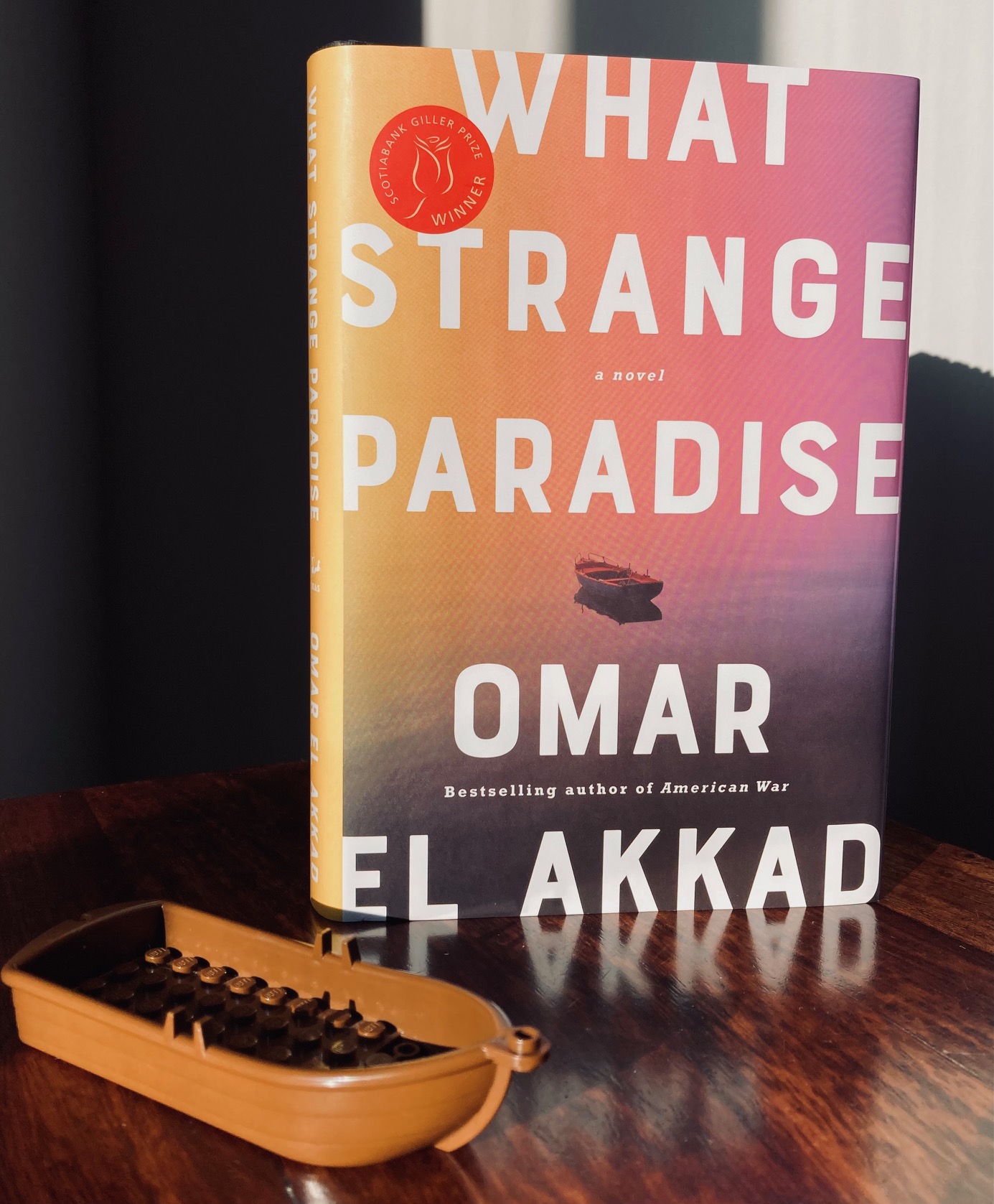Book Review: What Strange Paradise by Omar El Akkad

I purchased What Strange Paradise a few years ago, shortly after Omar El Akkad won the Giller Prize for writing it back in 2021. When he wrote it, he likely didn’t assume many readers would already be familiar with the book The Boy on the Beach by Tima Kurdi, the real-life account of what his work of fiction is clearly inspired by. Because I have now read both, I found the work of fiction hitting me even harder, an emotional punch to the gut that’s still lingering even days after I finished it. I remember feeling the same way after reading Akkad’s other work of fiction, American War. He’s a writer I like to follow, because I enjoy how effortlessly he ties the political and emotional together, although it usually takes me a few days to recover from his books.
Plot Summary
Nine-year-old Amir has washed up on the beach of a small island, miraculously surviving the crossing from his homeland across the sea. He is the only survivor of this particular passage, and quickly realizing he is in danger, runs into the forest to escape the soldiers chasing him. A teenage girl, Vanna, discovers Amir, and although they do not speak the same language, she realizes he is yet another refugee coming from across the sea, and needs her help. Together they seek shelter and food away from the roving soldiers intent on rounding up all migrants who land on their shores. Chapters alternate between the Vanna and Amir’s travels, and the ‘before’ of Amir’s life; how he came to be on the small fishing boat floating away from his family, and the harrowing trip across the sea that ends with a beach littered with bodies. The opening image of the book introduces Amir as a lifeless body, lying facedown on the beach. The placement of his body is reminiscent of The Boy on the Beach, that haunting image that continues to act as the horrific reminder of the refugee crisis still playing out in many other parts of the world. But this book gives Amir a second life, Akkad imagining what would happen if he was a survivor, rather than a victim.
My Thoughts
Despite the weighty subject, this book is surprisingly short at only 233 small pages. Vanna and Amir don’t have much time together, but we briefly learn about Vanna’s isolation on her own island, feeling as though she has never belonged, so the appearance of Amir lends her a temporary respite from this lonely life she leads. We occasionally get glimpses of the tourism industry her island still depends on, adding an almost unbelievable juxtaposition of life continuing on for some vs. life ending for others. For example, the beach has to close to tourists at the nearby resort when boats and bodies keep washing up, which is framed as an inconvenience for tourists and an ongoing stressor to those in charge on the island. This bizarre clashing of cultures is also discussed by the boat’s passengers as they search for land, discussing what their life could possibly look like if they survive the journey. Even the boat itself is not immune to the divisions of class and race; one boat passenger points out how much darker everyone’s skin is below decks which was the cheaper ticket, and everyone comments on how “The Africans” are down there. These observations, both on and off the island, remind the reader of how unfair life can be for many people, each navigating their own set of challenging circumstances.
Akkad is a journalist, which explains his ability to write about such difficult subjects with humanity. And like any good journalist, he writes about both sides of the conflict; in this book, we are offered an additional perspective; the army general so intent on tracking Amir down, and placing him in the holding area with the other refugees. Other ‘villains’ are also focused on throughout the story, including the men who sell passage on these boats fully knowing the lifejackets don’t float, and the boats are barely seaworthy. By illuminating these different perspectives and giving voices to all the small components of the problem, Akkad successfully depicts a geopolitical with all its complicated details. He begins with an image (the boy lying facedown on the sand) and from there, builds out the tangled web of intentions that led us to that point. Moments before the situation unravels on the boat Amir is travelling on, his uncle urges him to listen to his final piece of advice:
“Whatever happens, you have to promise me you’ll do whatever you have to. Whatever kind of person you need to be – quiet, loud, violent, invisible – you be that person. Promise me.”
-p.195 of What Strange Paradise by Omar El Akkad
Ultimately, this advice is what most characters in this book are doing – they are simply surviving in the only way they know how. Judgement is easy to pass on those we know nothing about, but when Akkad so brilliantly breaths life into all his characters, the previously black and white situation becomes muddled, yet striking. This is a difficult read, but a necessary one, inviting us to see the humanity behind the headlines we are too often becoming immune to.


One book that really muddled the immigrant situation for me was by TC Boyle. It’s called The Tortilla Curtain, and it’s set in southern California. A liberal couple live near the border between California and Mexico, and they are totally for letting in Mexican immigrants, and not making it difficult for them to become citizens. However, when one Mexican couple set up camp in the woods behind the couple’s house, things become increasingly more difficult. At one point, the immigrants almost accidentally burn down the woods. They leave trash on the ground. And so, you slowly see this liberal man and woman turn into raging conservatives, because they didn’t realize how they would feel if immigrants affected their personal lives. I think that’s the hard thing in this debate. Some people don’t want to share anything, and some people are really willing to share but can’t actually imagine what that would look like if it affected them personally.
Sounds like a good book! I can see why that couple would get annoyed. It’s easy for me to say ‘sure let everybody in’ when it doesn’t directly affect my quality of life. With climate change I’m sure this topic will be coming up more and more as more places on earth become inhabitable.
I’m wondering if the tipping point on climate change will be when all the expensive houses along the lakeside or oceanfront fall in and the rich people are inconvenienced. It’s already happening with the Great Lakes in Michigan.
I’m guessing that will be the point, yes. Not until it starts becoming more obvious in ‘rich nations’ i.e. Canada and the U.S. will people start caring more. Sadly, it’s just too easy for people to ignore when its’ not in their backyard
I’m wondering what’s up with the people in Florida, who are getting pounded by hurricanes, and the people in Texas, who are in a massive heat wave. I mean, old people are in Florida, and they vote a lot. DO SOMETHING!
yes!!!! Hopefully they listen.
Sounds powerful! Such a difficult topic which divides Britain more than just about anything else, since we have people arriving in boats (if they’re lucky) every day – some genuine refugees, many economic migrants paying gangs to smuggle them in illegally. When we vote this govt out in a year or two, the main reason will be that they haven’t found a solution to the boats. Which would be fine, if there was any sign that the people we’re about to vote in would do any better…
You have had a wild ride of political stuff lately in your part of the woods! I’m quite landlocked here in Alberta, but we occasionally have people coming across the American border (not typically Americans, but immigrants who moved to America and about to be sent back home or people travelling up through America b/c they heard Canada is better)
Haha, tell me about it! I can’t keep up! However happily I’m on the side that is thrilled that Sturgeon is finally being held to account – long overdue, in my opinion. Half the country totally disagrees with me though. Isn’t politics fun?? ;) Immigration is such a difficult subject here. Our biggest cities are so overcrowded already and yet every year more and more people are arriving in hundreds of thousands looking for housing and services. And yet anyone who says we can’t keep bringing people in in these numbers is immediately accused of racism. It seems to be impossible to have rational debate about anything these days. *sighs*
Yes I know things are already crowded in your neck of the woods. I’m hoping places here in Canada keep bringing people in, because it definitely isn’t crowded here – we have the room! haha
It’s been a couple of years since I read this book but it’s one I still think of.
Hi writing really does stick with you!
American War is so different but also still one that stuck with me too!
It does sound so powerful and I think the short length probably helps the reader absorb the sadness without getting too mired down. Great review, Anne!
thanks Laila!
It does sound so powerful and I suspect the brevity of length probably helps the reader absorb the sadness without getting too mired down. Great review, Anne!